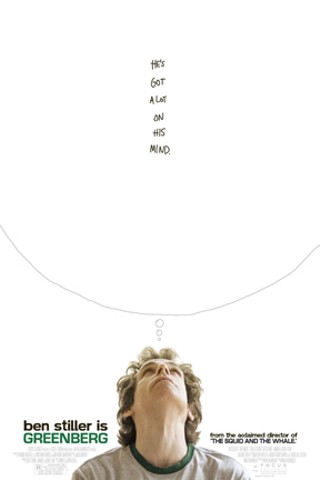The one thing that separates us from our robot masters is that we have genitals. And feelings.
Actually, genitals and feelings are deeply linked, and much of modern cinema is tasked with describing that relation. Also, in much of modern cinema, middle-age men fall in love with beautiful young women who reciprocate their feelings and massage their genitals. And usually, in such a film, when the man is feeling depressed and ready to give up on life and joy, the woman reintroduces him to happiness through her zany, care-free, two-dimensional, prop-like nature.
I mention this now, because Greenberg could be confused for this sort of film, and I wanted to get that out of the way before people start screaming "manic pixie girlfriend" and become afraid that Zach Braff will appear and say something that sounds like it was written by a teenager preparing for her first dose of Paxil.
Because, in spite of having some clichéd elements, Greenberg is pretty much brilliant. It has flaws, but the fact that it's part of a describable genre isn't one of them. Instead, it presents the genre elements as though no one had ever despoiled them. For starters, the film begins with, and gives nearly equal focus to, the female lead. Further, while she has a zany side, she's also a fully formed character who is not in the film solely for the purpose of redeeming the male lead; she's actually aware that redemption could easily become her role, and then she doesn't simply reject it, but rather makes some compromises with it. This is the kind of complexity that marks director Noah Baumbach's films, and while Greenberg might not surpass Baumbach's best, Margot at the Wedding, it's easily the best film so far this year.
Greta Gerwig plays Florence Marr, the female lead. It helps her credibility that she's beautiful without being shaped like a typical Hollywood actress, but it's the heavy naturalism in her performance that makes her so interesting to watch. The film starts with a gorgeous, quiet shot of her walking a dog on a hillside. Cinematographer Harris Savides creates some of the most overwhelmingly beautiful imagery in the business, and in this film, Baumbach has apparently given him free rein to balance colors, frame scenes and choose camera positions. The result is a sensitivity to tone that rivals the best of Sven Nykvist's color work, and a sense of scene that is matched in modern cinema only by Roger Deakins. Gerwig is a perfect subject for Savides, because her subtle expressiveness works so well in close-up, and her mannerisms are distinct and meaningful in more distant shots.
While the first 15 minutes or so are about 24-year-old Florence flouncing about in search of love and post-college purpose, the stinky center of the film appears when Ben Stiller, as the titular Roger Greenberg, arrives at his brother's palatial Los Angeles home after being released from a mental institution. I know, this smacks of Garden State or some equally horrid exercise in feeling-mongering, but wait! Greenberg is not the emotionally deadened cliché that haunts lesser films. And he is not redeemed by his inappropriate relations with Florence.
Instead of making him lovably vulnerable, his emotional damage has left him vicious and needy. When he's not pathetically mooning over Florence, he's berating her for no reason. His version of apologizing involves demanding that Florence take responsibility for her role in enabling him to act like an asshole. And when his old friends express regret that he turned down a record contract that would have made their band famous, he alternates between calling them sellouts and whining about his lack of success.
So he's no lovable man-child waiting for redemption; he's more like the Dick Cheney of boyfriends, advocating torture and then blaming everyone but himself. But Baumbach has a knack for finding psychological reality in unpleasant characters, and his dialogue paradoxically combines naturalness and poetry so perfectly that you'll find yourself entranced by Roger Greenberg even when, and especially when, he's at his most awful.
It's not that he ever becomes truly likable, but you begin to understand that he's a man who, given a choice between anxiety and depression, chooses lashing out at anyone who is nice to him. Stiller does a surprisingly good job here; in many ways, his role is reminiscent of Adam Sandler's role in Punch-Drunk Love. Each of those films took the basic elements of a romantic genre, showed how twisted the male characters would have to be to actually engage in the sorts of things you commonly see in romances, and used comic actors to horrifying effect.
Stiller's little tics, which can be annoying in his comedies, come out as symptoms of his neuroses here, and it basically works. Still, even though the film ultimately focuses on Greenberg, it's Gerwig who steals the show, and it's Baumbach's script and directorial choices, combined with Savides' always amazing cinematography, that makes Greenberg a perfect example of American cinema's rarely achieved, but never surpassed, ability to expose emotion without falling into schmaltz or pandering to pretense.











